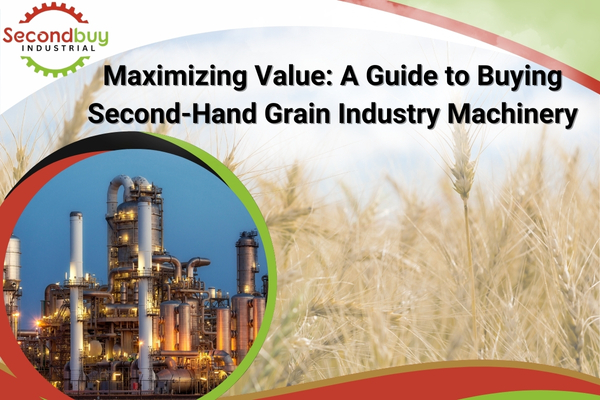Maximizing Value: A Guide to Buying Second-Hand Grain Industry Machinery
In the dynamic world of grain industry machinery, making the right investment decisions can significantly impact your productivity and profitability. While purchasing brand-new equipment may seem like the obvious choice, opting for second-hand machinery can offer substantial cost savings without compromising on quality. In this comprehensive guide, we'll explore the benefits of buying second-hand grain industry machinery and provide valuable insights to help you make informed purchasing decisions.
Why Choose Second-Hand Grain Industry Machinery?
Cost Savings: One of the primary advantages of buying second-hand grain industry machinery is the significant cost savings compared to purchasing new equipment. Second-hand machinery is often available at a fraction of the cost of new machinery, allowing you to stretch your budget further and maximize your investment.
Immediate Availability:
Unlike ordering new equipment, which may involve lengthy lead times for manufacturing and delivery, second-hand grain industry machinery is readily available for immediate purchase. This can be particularly advantageous if you're facing urgent equipment needs or looking to quickly expand your operations.
Proven Performance:
Many second-hand grain industry machinery has already proven its performance and reliability in real-world applications. By choosing equipment with a track record of success, you can have confidence in its ability to meet your production requirements and deliver consistent results.
Diverse Selection:
The second hand market offers a wide range of grain industry machinery, including harvesters, threshers, cleaners, sorters, and more. With such a diverse selection available, you can find equipment that precisely matches your specific needs and operational requirements.
Key Considerations When Buying Second-Hand Machinery:
Inspect the Equipment:
Before making a purchase, thoroughly inspect the second hand grain industry machinery to assess its condition and functionality. Look for signs of wear and tear, damage, or mechanical issues that may affect performance. If possible, request a demonstration or test run to evaluate the equipment in action.
Check Maintenance Records:
Inquire about the maintenance history of the machinery, including any repairs or servicing performed. Well-maintained equipment is more likely to offer reliable performance and longevity, so be sure to verify that the machinery has been properly cared for and serviced regularly.
Verify Compatibility:
Ensure that the second-hand machinery is compatible with your existing equipment and production processes. Consider factors such as capacity, power requirements, and compatibility with other machinery in your operation to avoid compatibility issues and operational disruptions.
Research the Seller:
Choose a reputable seller or dealer with a proven track record of selling high-quality second-hand machinery. Read reviews, testimonials, and references from other buyers to gauge the seller's reliability, customer service, and overall reputation in the industry.
Conclusion
Buying second hand grain industry machinery can be a cost-effective way to maximize the value of your investment and enhance your operational efficiency. By considering factors such as cost savings, immediate availability, proven performance, and careful inspection, you can make informed purchasing decisions that meet your production needs and contribute to the success of your grain industry operation.

